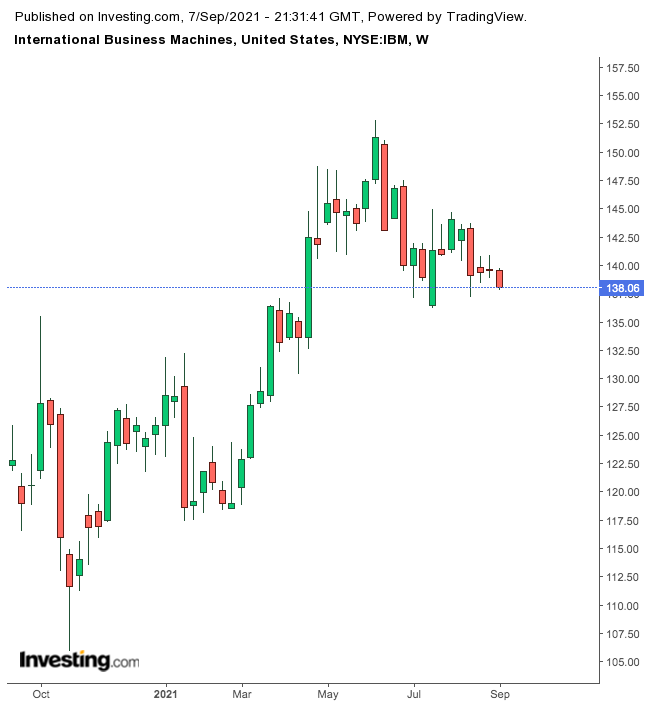International Business Machines (NYSE:IBM) is not the kind of technology stock that catches investors’ attention. Unlike other blue-chip stocks, this 109-year-old company is struggling to revive growth and compete in an environment where it has been left far behind.
For context, IBM has a market capitalization of about $125 billion. That is a fraction of Apple's (NASDAQ:AAPL) $2.57 trillion, Microsoft's (NASDAQ:MSFT) $2.24 trillion and Amazon's (NASDAQ:AMZN) more than $1.7 trillion.
The major reason for this underperformance is that the past decade was a lost one for the software and services giant as it remained irrelevant in the fast-changing technology world, failing to innovate and losing ground to new entrants.
During Virginia Rometty’s eight years at the helm, IBM proved to be dead money for investors. This was the decade when Amazon, Microsoft and Alphabet (NASDAQ:GOOGL) all rallied as demand soared for computing power and applications.
But since her departure last year, there are signs that Big Blue, as it's sometimes referred to colloquially, is gaining lost ground. IBM's new management structure has brightened prospects for the company’s long-term growth after many years of declining sales.
The New York-based company in July posted its biggest quarterly increase in revenue in three years, boosted by strong cloud-computing demand. These numbers helped push IBM stock 10% higher this year. It closed Tuesday at $138.06

Cloud Computing And AI
Arvind Krishna, who took over as CEO last April, is focusing on artificial intelligence and the cloud to revive growth. Krishna has reorganized the company’s business around a hybrid-cloud strategy, which allows customers to store data in private servers and on multiple public clouds. IBM completed its purchase of Red Hat for $33 billion in 2019, the first step in a shift to what it calls hybrid-cloud.
IBM, in our view, is a safe dividend stock, especially after its new management’s clear shift to cloud computing, which is a high-growth business. These steps are encouraging and could unlock the value of IBM stock, which has hiked its dividend for 26 years straight.
The stock currently pays $1.64 a share quarterly dividend, which translates into 4.7% annual dividend yield, making it one of the highest-yielding stocks among the blue-chip companies.
Morgan Stanley, while raising the price target from $152 to $164, said that IBM’s turnaround is on track due to improving execution and strengthening demand. In a recent note, the investment bank said:
“A higher-quality revenue beat, improving macro trends, and important investments in talent, partnerships, and go-to-market improve our confidence in a 2022 growth acceleration.”
Under Krishna’s tenure the company has made many acquisitions to accelerate growth. The company spent about $3 billion in the first half of this year to bolster cloud and AI capabilities, including the purchase of Turbonomic Inc. and Italian process mining firm myInvenio. Most recently IBM bought Madrid-based Bluetab Solutions Group in an effort to extend its reach in Europe and Latin America.
In a separate note, Credit Suisse said the strong second-quarter results should help get the stock back on track.
In its note, Credit Suisse stated:
"We look toward the planned 4Q spin-off of Kyndryl as a key catalyst, easing the path to sustained growth, which supports multiple expansion ahead.”
Bottom Line
When it comes to growth, during the past decade, IBM has certainly disappointed its investors. But after the Red Hat acquisition and with new management in place, we see IBM slowly getting back on a path to growth. IBM’s healthy balance sheet, manageable debt and more than 5% dividend yield make its stock a bet worth considering, especially when its turnaround is gaining pace.
